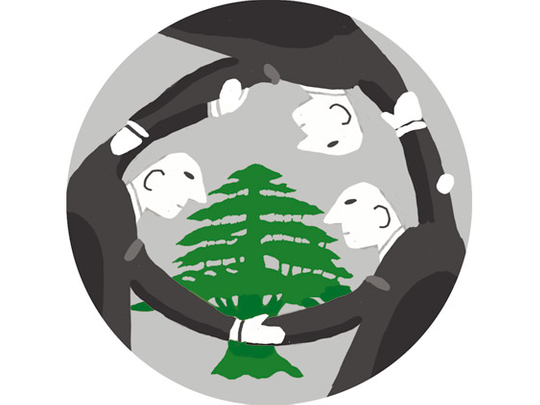
Unless the Lebanese wise up, the country is headed for a break-up that will see Israel grab the South for its water resources and Syria occupy the Beqa Valley, the latter confiscated by the French after the poorly devised 1916 Sykes-Picot land redistribution initiatives that passed for policies.
Once again, tensions are running high, with fears that the UN-backed Special Tribunal for Lebanon (STL) will indict rogue Hezbollah operatives for the February 14, 2005 murder of former Lebanese prime minister Rafik Hariri.
In fact, emotional remarks by Hezbollah Secretary-General Hassan Nasrallah, who questioned the very credibility of the tribunal, sparked fears of renewed sectarian conflict between Sunnis and Shiites similar to the May 7, 2008 confrontations that paralysed the country. Are these genuine concerns and will Lebanon be subjected to renewed internecine warfare?
There are two sets of controversial questions that deserve attention: the tribunal itself and Hezbollah's putative responses.
Calls for Lebanon to move beyond the STL, which is mandated under a Security Council Chapter 7 initiative to find killers in over 25 cases of political violence, fail to appreciate how little Beirut can actually do about it at this late hour even if five long and largely wasted years have passed without significant results. Simply stated, STL is an independent body that stands beyond Beirut's reach.
Still, beyond finding some of the killers that spread havoc in the hapless country after 2005, its real purpose is to support Lebanon's fragile but solidly anchored democratic foundations, which validate the legitimacy of the state and its enduring institutions.
One should never tire of declaring that Beirut is truly unique in the Middle East as it confronts existential threats to its unity and pays the price for complacency and neglect. Indeed, the greatest challenge is to uphold the law, so that ordinary Lebanese continue to believe that those who perpetrated murderous outrages will face justice.
Today, speculation that the STL will find a few Hezbollah operatives guilty frightens many, even if no one really knows what the tribunal will do. It is for this reason that Lebanon requires internal, regional and international support, since it is illogical to assume that the smallest Arab country can bear huge stability costs in a part of the world filled with predators.
Consequently, domestic and/or foreign actors threaten to control the country although people are resilient, willing to pay any price, bear any burden and meet any hardship.
It is within this context that Nasrallah's series of televised speeches must be fathomed. Beyond their intimidating qualities, his pleas with Beirut to reconsider existing choices underscore his outrage at Damascus, ostensibly because Syria's President Bashar Al Assad and Prime Minister Sa'ad Hariri reached rare understandings. In line with stately functions, the two countries placed national interests above everything else, which is one of the reasons why Nasrallah was shocked at recent Syrian actions.
Not untouchable
While it is true that Hezbollah is the most powerful military force in Lebanon, and fought valiantly against Israel for decades, the devastating 2006 war also illustrated intrinsic limits to its abilities. It may be worth remembering that notwithstanding the May 7 skirmishes against Sunnis in the heart of Beirut, Hezbollah operatives were routed in the Shouf Mountains, at the hands of Druze warriors.
In other words, Hezbollah intimidated the Lebanese militarily and may do so again, though it seldom demonstrated the wherewithal to rule politically. Truth be told, Hezbollah gunmen may control the ground in future clashes, but General Michel Aoun's long contemplated coup d'état, to topple the government and install himself at the presidential palace, was unlikely to ever occur.
Such a gargantuan political error would be akin to both an admission of guilt and, worse, a catastrophic Hezbollah/Aoun rejection of established Lebanese political traditions to operate under the Constitution.
Therefore, it may be safe to conclude that fears of renewed wars in Lebanon are misplaced, with the sole exception of clashes between Hezbollah and Israel after an attack on Iran's nuclear facilities. Over the next few days, Saudi Arabia's King Abdullah Bin Abdul Aziz will visit Beirut, along with Shaikh Hamad Bin Khalifa Al Thani, Emir of Qatar, and Al Assad.
The three men will hold serious talks with President Michel Sulaiman, call for self-control amid rising apprehensions, and insist that justice prevail. In turn, Beirut will emphasise that no one should live in a land where injustice is widespread, which will require full backing of the STL.
Lebanon is a weak but modernising state. Though less than a century old, it nevertheless has a 6,000-year old history, with legacies that shaped and defined its population. In the post-1990 environment, Lebanese ruling families and parties embarked on rebuilding tarnished state institutions, which endured conflict and violence galore.
Hundreds of thousands perished in the past and it would be futile to sacrifice another generation of its brilliant youths to satisfy chimerical dreams that aim to transform the land of milk and honey into something it steadfastly refuses to become. Shrewd Lebanese politicians ought to prevent the next firestorm before their machinations unravel the country for good.
Dr Joseph A. Kechichian is a commentator and author of several books on Gulf affairs.









